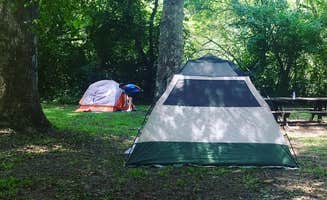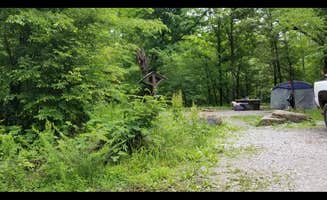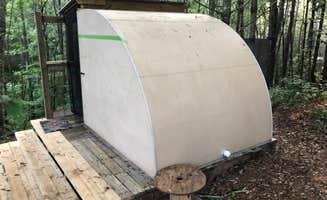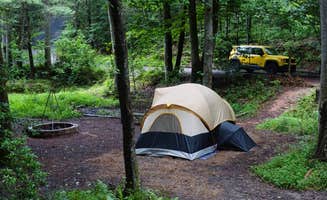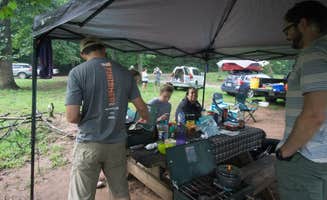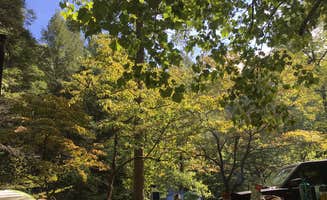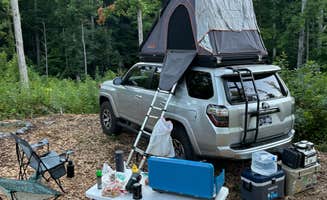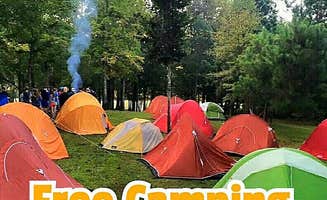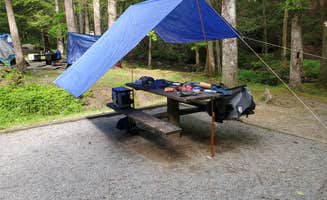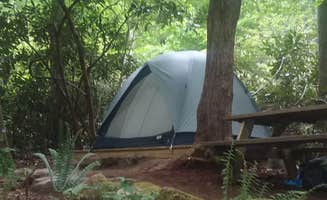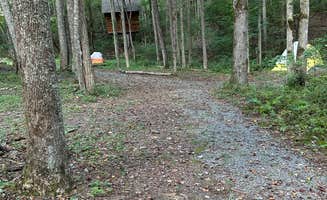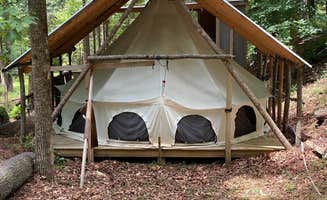Tent camping near Turtletown, Tennessee offers diverse wilderness experiences within the Cherokee National Forest, where elevations range from 1,500 to over 2,000 feet. The region features multiple free dispersed camping areas alongside creeks and rivers, with primitive camping options typically available year-round despite occasional winter closures after heavy snowfall. Campers should note that bear activity increases significantly during spring and fall months.
What to do
Hiking on Starr Mountain: Access challenging but rewarding terrain from Gee Creek Road with approximately 0.5 miles of steep hiking to reach the summit. "This place is amazing. The trail isn't really a trail but it's so worth it. if you enter through gee creek rd it's only about half a mile to the top. It is an off beat path and there are no markings. The key is to keep going up," notes a visitor to Starr Mountain Area.
Creek exploration: Many tent sites in the region offer direct water access for wading and cooling off during summer months. At Lost Creek Campground, one camper mentioned, "We chose a spot next to the creek. Was clear and flowing due to a lot of rain the few days before we arrived... The highlight would definitely be the creek. There are spots that you can swim around in."
Fishing before dam release: Fish directly from campsites at several riverside locations before daily water releases change conditions. "We went fly fishing right from the campsite. The water gets released at 11am, so the current picks up and water levels will rise quickly," reports a camper from Hiwassee River Area.
What campers like
Remote location access: Despite primitive conditions, many sites offer surprisingly easy access to wilderness areas. "The lost cove campground can be found deep in the wilderness of the Cherokee National Forest outside of Benton, TN. The campground is operated and maintained by the USFS. Once leaving the pavement of the main road and traversing a well maintained gravel road for 7 miles you will reach the Lost Cove Campground," explains a visitor.
Natural springs: Multiple camping areas feature natural springs for water collection. At Your Toccoa River Cove, campers appreciate that "There is a spring you can drink straight out of, and streams criss-crossing the entire area if you want the rugged feeling of purifying your own water."
Seasonal isolation: Fall and winter months bring notably fewer visitors to many campgrounds. One camper at Chilhowee Campground noted, "We stayed during the week, so I can't say whether the noise level picks up on the weekends... This is easily the quietest campsite (with electric, showers, and lake access) that we have encountered to date."
What you should know
Hunting season awareness: Some campgrounds experience increased activity and noise during hunting seasons. A Lost Creek visitor reported, "We apparently went during hunting season. Had to have been a dog sport. Too many dogs running around and barking throughout the night. Other than that we enjoyed our stay."
Weather impacts on access: Gravel roads leading to remote sites can deteriorate significantly after storms. A camper mentioned about reaching Lost Creek, "Super remote area, ride were in decent shape, I could see them being bad after a heavy storm. Gravel 7 miles to here."
Cell service limitations: Most primitive camping areas have limited or no cell service. At Goforth Creek Campground, visitors should prepare for complete disconnection, with no coverage from major carriers. Service typically returns once you reach main roads.
Tips for camping with families
Shelter alternatives: Sites with covered areas provide backup options during unexpected weather. "There's a large shelter stocked with a table, chairs, lanterns, and a two-burner camp stove for the glamping crowd, with plenty of floor space to throw down a sleeping bag," reports a visitor to Your Toccoa River Cove.
Protected swimming areas: Family campers prefer locations with designated swimming spots away from river currents. "The lake is beautiful and quiet," notes a visitor to Chilhowee Campground, describing their safe water access option.
Space requirements: Consider site dimensions when bringing multiple tents for family camping. "We had 2 tents and could have fit 3 more. No lights, so it's pretty dark after 10pm," explains a camper from Hiwassee River Area about their spacious campsite layout.
Tips from RVers
Access limitations: Most primitive camping areas near Turtletown have significant RV restrictions. "The driveway down to the shelter is very steep, and does not allow much space to turn around. RVs or larger trucks will not fit," warns a visitor to Your Toccoa River Cove, highlighting a common challenge for larger vehicles in this mountainous region.
Site surface preparation: RV campers should prepare for potentially uneven surfaces. "The campsite was crushed stone chips, and I suspect it would drain well after a storm," notes a visitor to Chilhowee Campground, one of the few areas that can accommodate smaller RVs and trailers.
Small trailer options: Consider small trailers rather than full-size RVs. One camper at Chilhowee noted, "Our site was clean, shaded and level. We had plenty of space for our 6 x 12 converted cargo trailer camper and Outback," showing the feasibility of modest setups in the region.


